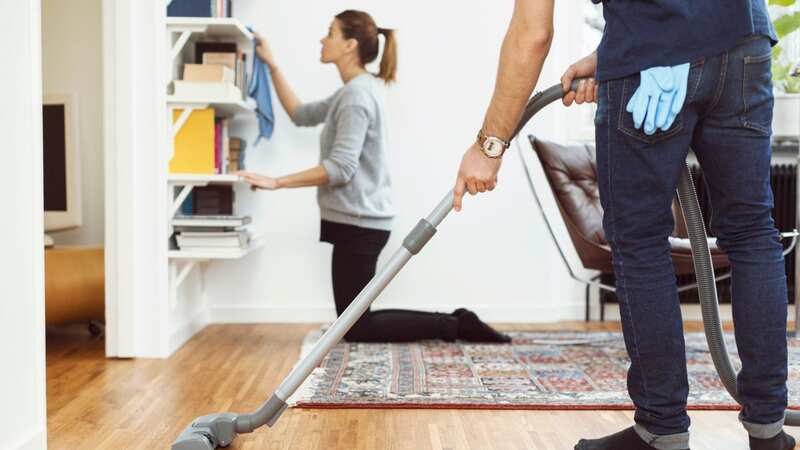Expert shares unexpected cleaning products that could be ruining your floors

Getting the perfect shine on your floor is the goal because nothing screams 'I've spring cleaned' quite like a sparkling room from top to bottom.
Many people will stick to a similar cleaning routine each time they do it, but one expert has warned that using certain products on your floors may be doing more harm than good, and could even be causing a whole lot of damage in the long term.
Flooring King's flooring trends expert Liam Cleverdon has shared the products you should try to avoid when cleaning your floors, alongside some floor-friendly alternatives to ensure your house looks spick and span.
Vinegar
Liam explained that vinegar is a "staple home remedy for many issues", but this isn't the case when it comes to getting the floors clean. This is because "its acidic properties can strip the floor's finish and fade shine, leading to a dull appearance over time."
He said: "Avoid vinegar on hardwood floors at all costs, as this can leave a negative, unpleasant impact on the flooring. The same applies to no-wax floors such as vinyl or linoleum, as vinegar can dim and darken its surface. However, if you have laminate flooring, vinegar can be a useful cleaning solution, although I advise you to take caution when using it and use it in a small, diluted dose mixed with water."
 Cleaning guru shares why you shouldn't make your bed first thing in the morning
Cleaning guru shares why you shouldn't make your bed first thing in the morning
Lemon juice
Again, a fantastic hack for other things within the home, but it doesn't work on floors as "a lemon's acidic properties can harm the flooring." It can definitely offer "cleaning benefits", but it can also take as much as it gives because it can "ruin the quality of your floors and weaken the wood."
He continued: "Although it's great for removing stains, be careful when removing the colour and character of the flooring. This predominantly applies to hardwood. However, if you intend to use lemon juice as a floor-cleaning method, use it in small dosages with water."
Bleach
Liam explained that "using bleach to clean your floors can cause irreversible damage", and he urged people to remember it's a "disinfectant rather than a cleaner." He said it can "strip away the colour of flooring", and can also "weaken the material" of hardwood. "Applying bleach on vinyl flooring is also damaging as it can cause the material to break down over time", he said, urging people to avoid it on wood laminate flooring too, as "bleach can stain the surface while diluting its colour and shine."
Oil
Liam said that oil may sound "cost-effective", but it can "cause damage to material, sealant, and appearance." He shared: "Using oil to clean laminate flooring can leave streaks and residue, resulting in an unpleasant appearance. The oil can also damage the protective sealant of the floors, leaving them vulnerable and prone to wear and tear."
He said that "buildup" can also occur on hardwood flooring, so should be avoided as it is "a challenge to remove." He continued: "However, a small amount of diluted oil is safe to use on your flooring and even helps add a bit of shine. Your tiles are also vulnerable to oil, as the residue left on the surface can attract more dirt."
Ammonia
Liam said: "Ammonia is among the worst ingredients you could use to clean your floors as it strips away the essence of flooring including wood, laminate, vinyl, linoleum, and cork. It's notorious for causing discolouration and removing sheen, ultimately hindering the overall finish of the floor."
It can "alter the appearance and character of your floors" and can "deteriorate the structure, leading to complications during damage control", so it's best to avoid it, "no matter which type of flooring you have."
Floor-friendly alternatives
Liam recommended using pH-neutral soap and a microfibre mop to clean your floors. He said: "A mixture of a quarter cup of mild or pH-neutral soap with water, paired with a microfiber mop, is a floor-friendly, versatile cleaning method for various materials. This can be applied to polyurethane-finished hardwood floors, porcelain tiles, and stone flooring, as its inoffensive properties ensure a safe clean with a fresh finish." Also, he recommended opting "for sweeping or vacuuming, removing dirt without harming your flooring."
Read more similar news:
Comments:
comments powered by Disqus

































